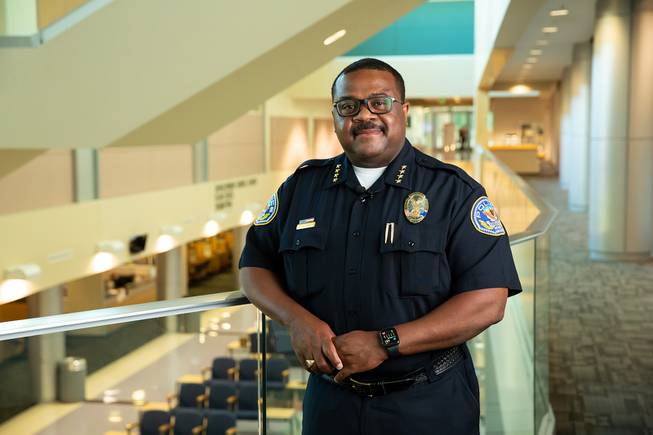Friday, Aug. 21, 2020 | 2 a.m.
View more of the Sun's opinion section
Editor’s note: As he does every August, Brian Greenspun is turning over his Where I Stand column to others. Today’s guest is Henderson Chief of Police Thedrick Andres, who has led Nevada’s second-largest city’s police department since 2019 and has nearly 30 years of law enforcement experience.
Over the past several weeks, a constant stream of family, friends and community members has asked me the same question: “Does community policing really work?” As a police chief and longtime law enforcement leader, my answer is always: “Absolutely!”
This belief is not just wishful thinking. Numerous research-based studies demonstrate that police-community relations are effective in reducing crime and improving the quality of life in our neighborhoods. Moreover, these findings are supported by the results we have achieved through our innovative City of Henderson policing programs.
As a nationally accredited agency, the Henderson Police Department continually evaluates our policy, procedures, training and community surveys to ensure we are providing premier services to our residents and visitors. And following my annual examination of these measures, I can say unequivocally that community policing has helped to improve public safety in Henderson, particularly in the areas of officer safety and police legitimacy during our interactions with the public.
More importantly, when community policing is implemented appropriately, police officers and the communities they serve can benefit equally. This success is based on the beat officer’s primary goal, which is to build a constructive relationship with community members as they actively work to ensure their policing efforts are productive. As a result, residents and business stakeholders are more likely to cooperate with police, keep a watchful eye over their neighbors and report suspicious individuals or criminal incidents when they know and trust us.
Despite these positive outcomes, sustaining success in community policing will not be easy. It will require unconventional partnerships with local nonprofit organizations and a willingness to acknowledge the mistakes of the past that members of the police have made. But I am confident that premier law enforcement agencies like the Henderson Police Department can build even stronger partnerships in the future through community conversations and engagement.
Nationally, police officers must understand that the community will look at us through a different lens when the entire profession demonstrates procedural justice in all our police contacts. The goals of every police department should include building community trust one conversation at a time. And to maintain actual police legitimacy, police officers must strive to be courteous, fair and respectful to every individual when performing their duties.
The Henderson Police Department understands the importance of proactive community engagement and our officers work hard to incorporate it in their daily outreach. We use common strategies to increase police legitimacy including face-to-face visits between community members and police officers. These personalized contacts, such as Talk Shop with a Cop, Chief’s Community Forums and National Night Out Against Crime, help increase public trust and confidence and foster stronger community-police relationships.
Finally, as community policing continues to evolve, we must remain committed to engaging in cooperative discussions that will produce opportunities to improve police-community relations. Nationwide, our communities have made their voices heard in demanding professionalism and impartiality from law enforcement officers. Moving forward, for law enforcement to be more effective, we must remember the golden rule of treating others how you would want to be treated.

